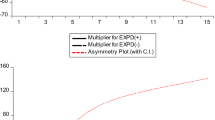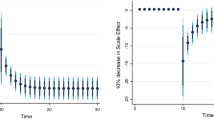Abstract
The aim of this paper is to explore the environmental effects of fiscal decentralisation from theoretical and empirical perspectives. We first analyse the dynamic relationship between fiscal decentralisation and the environment using an endogenous growth model. Our findings demonstrate that fiscal decentralisation and environmental pollution display an inverted U-shaped relationship. We then use provincial panel data from 1998 to 2015 in the empirical investigation of CO2 emissions in China. Our findings show that empirical results verify the correctness of the theoretical results. The results obtained are robust using different methods. The findings of this work may help China’s central government and local governments in addressing the problem of CO2 emissions by using a reasonable degree of fiscal decentralisation.
Similar content being viewed by others
Notes
These used data in this study are not afflicted with a high degree of multicollinearity because the maximum variance inflation factor is 1.623.
The 30 provinces and municipalities are Beijing, Tianjin, Hebei, Liaoning, Shanghai, Jiangsu, Zhejiang, Fujian, Shandong, Guangdong, Hainan, Shanxi, Inner Mongolia, Jilin, Heilongjiang, Anhui, Jiangxi, Henan, Hubei, Hunan, Guangxi, Chongqing, Sichuan, Guizhou, Yunnan, Shaanxi, Gansu, Qinghai, Ningxia and Xinjiang.
References
Aghion P, Howitt P (1998) Endogenous growth theory. MIT Press, Cambridge
Baskaran T (2010) On the link between fiscal decentralization and public debt in OECD countries. Public Choice 145(3-4):351–378
Beck N, Katz JN (1995) What to do (and not to do) with time-series cross-section data. Am Polit Sci Rev 89(3):634–647
Blanchard O, Shleifer A (2001) Federalism with and without political centralization: China versus Russia. IMF Staff Pap 48:171–179
Davoodi H, Zou H (1998) Fiscal decentralization and economic growth: a cross-country study. J Urban Econ 43(2):244–257
Dinda S (2005) A theoretical basis for the environmental Kuznets curve. Ecol Econ 53(3):403–413
Du J, Fang H, Jin X (2014) The “growth-first strategy” and the imbalance between consumption and investment in China. China Econ Rev 31:441–458
Faguet JP (2004) Does decentralization increase responsiveness to local needs? evidence from Bolivia. J Public Econ 88:867–893
Frankel JA, Rose AK (2005) Is trade good or bad for the environment? sorting out the causality. Rev Econ Stat 87(1):85–91
Garzarelli G (2004) The theory of fiscal federalism as a theory of economic organization: assessment and prospectus. Working Paper, Department of Economics, Università Degli Studi di Roma, “La Sapienza”, Roman, Italy
Guan D, Hubacek K, Weber CL, Peters GP, Reiner DM (2008) The drivers of Chinese CO2 emissions from 1980 to 2030. Glob Environ Chang 18(4):626–634
He Q (2015) Fiscal decentralization and environmental pollution: evidence from Chinese panel data. China Econ Rev 36:86–100
He C, Pan F, Yan Y (2012) Is economic transition harmful to China’s urban environment? evidence from industrial air pollution in Chinese cities. Urban Stud 49(8):1767–1790
Jia J, Guo Q, Zhang J (2014) Fiscal decentralization and local expenditure policy in China. China Econ Rev 28:107–122
Kuai P, Yang S, Tao A, Zhang S, Khan ZD (2019) Environmental effects of Chinese-style fiscal decentralization and the sustainability implications. J Clean Prod. https://doi.org/10.1016/j.jclepro.2019.118089
Li H, Zhou L (2005) Political turnover and economic performance: the incentive role of personnel control in China. J Public Econ 89(9-10):1743–1762
List JA, Gerking S (2000) Regulatory federalism and environmental protection in the United States. J Reg Sci 40:453–471
Liu J, Chen X, Wei R (2017) Socioeconomic drivers of environmental pollution in China: a spatial econometric analysis. Discret Dyn Nat Soc. https://doi.org/10.1155/2017/4673262
Madsen JB (2007) Technology spill over through trade and TFP convergence: 135 years of evidence for the OECD countries. J Int Econ 72(2):464–480
Maskin E, Qian Y, Xu C (2000) Incentives, scale economies, and organization forms. Rev Econ Stud 67(2):359–378
Mi Z, Zhang Y, Guan D, Shan Y, Liu Z, Cong R, Yuan XC, Wei YM (2016) Consumption-based emission accounting for Chinese cities. Appl Energy 184:1073–1081
Millimet DL (2003) Assessing the empirical impact of environmental federalism. J Reg Sci 43:711–733
Musgrave R (1959) Public finance. McGraw–Hill, New York
Oates WE (1972) Fiscal federalism. Harcourt Brace Jovanovich, New York
Oates WE (2005) Toward a second-generation theory of fiscal federalism. Int Tax Public Financ 12(4):349–373
Pesaran MH (2004) General diagnostic tests for cross section dependence in panels. Cambridge Working Papers in Economics No. 0435, University of Cambridge, Cambridge, June.
Pesaran MH (2007) A simple panel unit root test in the presence of cross-section dependence. J Appl Econ 22(2):265–312
Qian Y, Weingast BR (1997) Federalism as a commitment to preserving market incentives. J Econ Perspect 11(4):83–92
Qian Y, Xu C (1993) Why China’s economic reforms differ: the M-form hierarchy and entry/expansion of the non-state sector. Econ Transit 1(2):135–170
Que W, Zhang Y, Liu S, Yang C (2018) The spatial effect of fiscal decentralization and factor market segmentation on environmental pollution. J Clean Prod 184:402–413
Roodman D (2006) How to do xtabond2: An introduction to “difference” and “system” GMM in Stata. Center for Global Development Working Paper No. 103
Rubinfeld D (1987) Economics of the local public sector. In: Auerbach AJ, Feldstein M (eds) Handbook of Public Economics, vol II. Elsevier, New York
Saboori B, Sulaiman J, Mohd S (2012) Economic growth and CO2 emissions in Malaysia: a cointegration analysis of the environmental Kuznets curve. Energy Policy 51:184–191
Sadorsky P (2013) Do urbanization and industrialization affect energy intensity in developing countries? Energy Econ 37:52–59
Salahuddin M, Gow J (2019) Effects of energy consumption and economic growth on environmental quality: evidence from Qatar. Environ Sci Pollut Res 26(18):18124–18142
Shan Y, Liu J, Liu Z, Shao S, Wang P, Guan D (2016) New provincial CO2 emission inventories in China based on apparent energy consumption data and updated emission factors. Appl Energy 184:742–750
Shan Y, Guan D, Zheng H, Ou J, Li Y, Meng J, Mi Z, Liu Z, Zhang Q (2018) China CO2 emission accounts 1997–2015. Sci Data 5:170201
Sigman H (2007) Decentralization and environmental quality: an international analysis of water pollution. National Bureau of Economic Research No.13098
Stokey NL (1998) Are there limits to growth? Int Econ Rev 39(1):1–31
Tiebout CM (1956) A pure theory of local expenditures. J Polit Econ 64(5):416–424
Wu Y, Heerink N (2016) Foreign direct investment, fiscal decentralization and land conflicts in China. China Econ Rev 38:92–107
Yang Z (2016) Tax reform, fiscal decentralization, and regional economic growth: new evidence from China. Econ Model 59:520–528
Acknowledgments
We express our genuine appreciation to the Natural Science Foundation of Jiangsu Province of China (BK20190792) for supporting this study.
Author information
Authors and Affiliations
Corresponding author
Additional information
Responsible editor: Nicholas Apergis
Publisher’s note
Springer Nature remains neutral with regard to jurisdictional claims in published maps and institutional affiliations.
Rights and permissions
About this article
Cite this article
Liu, L., Li, L. Effects of fiscal decentralisation on the environment: new evidence from China. Environ Sci Pollut Res 26, 36878–36886 (2019). https://doi.org/10.1007/s11356-019-06818-z
Received:
Accepted:
Published:
Issue Date:
DOI: https://doi.org/10.1007/s11356-019-06818-z




